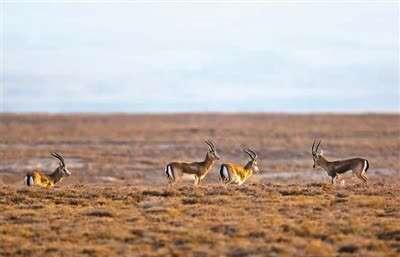
Gansu Gaotai, goose-throated antelope appeared in Xinba Town.
Photo by Zhang Hanjun (People's Photo)
For a long time, the bad habit of a small number of people eating wild game has been repeatedly prohibited, and the flying in the sky, running on the ground, and swimming in the water have been included in the diet as much as they can, which not only brings harm to wild animals, but also brings many challenges to human health and public health safety. In 2019, at the Conference of the Parties to the Convention on International Trade in Endangered Species of Wild Fauna and Flora, China advocated the concept of cracking down on illegal trade in wild animals and plants in the whole chain, including countries of origin, transit and destination.
In order to protect wild animals, save rare and endangered wild animals, and maintain biodiversity and ecological balance, the Standing Committee of the National People's Congress recently deliberated on the Law of the People's Republic of China on the Protection of Wild Animals (Revised Draft). The revised draft calls for resolutely banning and severely cracking down on illegal wildlife markets and trade, and strengthening the management of the whole chain of hunting, transporting and trading wild animals. The revision has revised key issues such as prohibiting the indiscriminate consumption of wild animals, prohibiting illegal hunting and trading, and increasing penalties, marking that China's wildlife protection has entered a new era.
Nowadays, the call for "banning wild meat" is getting louder and louder, and various localities have taken measures to completely ban the consumption of wild animals. Since the beginning of this year, Guangdong Province has issued more than 60 work measures and guidance documents to completely ban the consumption of wild animals, and strengthen the supervision and management of various links such as source hunting, intermediate circulation, and terminal utilization.
With the popularity of online platforms, e-commerce platforms, social platforms, short video platforms, etc. have become places for illegal transactions. On September 18 this year, the Beijing Municipal Bureau of Market Supervision convened the heads of 6 Internet companies, including Meituan, Ele.me, JD.com, Weidian, Douyin, and Kuaishou, to hold an administrative interview meeting on the implementation of the "Yangtze River Ban on Fishing and Fighting Non-Broken Chain" work e-commerce platform, requiring e-commerce platforms to immediately carry out self-examination and self-correction, strengthen the qualification review and content review of platform users, and focus on checking whether the merchant's store name, menu, dish, promotional pictures, tableware, etc. contain illegal words.
After fasting and forbidding the breeding of wild animals, how to transform and develop is a problem faced by all farmers, and it has also become one of the important contents of ecological construction.
For the compensation of wild animal farmers, Guangdong Province issued the "Regulations on the Protection and Management of Wild Animals in Guangdong Province" issued on March 31, 2020, stipulating that local governments should support, guide and help affected farmers to adjust and change their production and operation activities, give certain compensation according to the actual situation, take farmers who cultivate legally and suspend business in accordance with regulations as the object of compensation, give priority to compensating poor households, and do not compensate those who obtain administrative permits in violation of regulations or engage in aquaculture in violation of regulations. As of November 10, Guangzhou and 18 other cities have formulated withdrawal disposal plans or guidance opinions, Guangdong Province has completed the withdrawal and disposal of 5448 farming households, completed the disposal of 47.1423 million wild animals (only), compensation funds were issued in place 998 million yuan, basically completed the disposal compensation work.
Farmers are also actively seeking a way out. Recently, Fu Junqi of Sanlian Village, Hekou Town, Xiangtan County, Xiangtan City, Hunan Province, was busy picking carrots, cabbage, etc. at the vegetable base, and after hitting the packing truck, he would send it to a wholesale market in Zhuzhou City for the first time. The grower, who is busy picking vegetables, used to farm wild black water chickens. In May 2019, Fu Junqi purchased more than 600 black water chickens from Hubei and other places. Subsequently, Xiangtan County issued a document advising it to quit the wildlife breeding industry.
"At that time, I felt like a blow to the head, invested more than 100,000 yuan of funds, and before I could generate 1 penny of income, I was going to quit." But the state has a policy, and we have to implement it. Looking back now, it was good to grow vegetables after a successful transformation. Fu Junqi introduced that next year he plans to adopt a three-dimensional planting model, so that vegetables, fruits and other fruits and vegetables grow in the same greenhouse, so as to save limited land space and drive the surrounding masses to work hard and get rich.
With the joint efforts of all walks of life, Remarkable achievements have been made in the protection of wild animals and plants in China, and the population of precious and endangered terrestrial wild animals has been continuously restored. A series of measures such as the revision of the Wildlife Protection Law, the strengthening of habitat protection, reasonable compensation and job placement have played an important role in promoting green development and promoting harmonious coexistence between man and nature. Zhang Yue
Source: People's Daily Overseas Edition